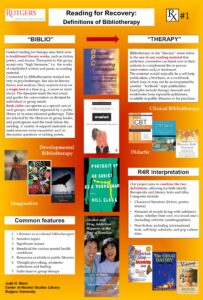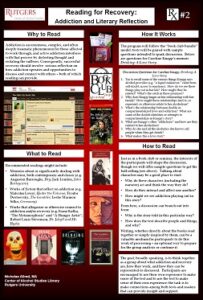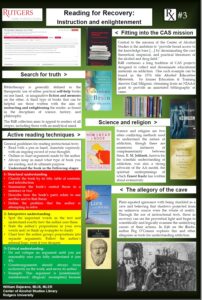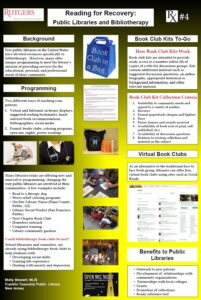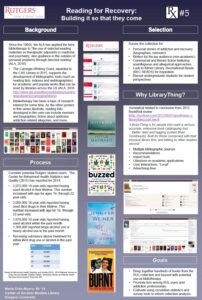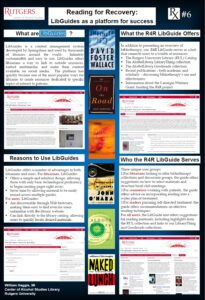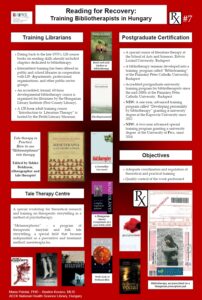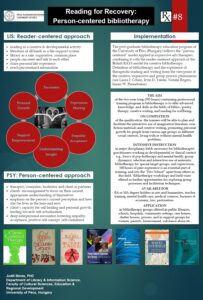Reading for Recovery
 Reading for Recovery, a resource geared towards those interested in the use of bibliotherapy (i. e., guided reading) as part of recovering from substance use problems. It was created at the Rutgers Center of Alcohol Studies Library in 2015-2016 with the help of a Carnegie-Whitney grant awarded by the American Library Association. It aims to provide a comprehensive online collection of titles to complement the support system for people with substance use problems.
Reading for Recovery, a resource geared towards those interested in the use of bibliotherapy (i. e., guided reading) as part of recovering from substance use problems. It was created at the Rutgers Center of Alcohol Studies Library in 2015-2016 with the help of a Carnegie-Whitney grant awarded by the American Library Association. It aims to provide a comprehensive online collection of titles to complement the support system for people with substance use problems.
Reading can be powerful at moments of crisis or crossroads. Bibliotherapy in R4R is defined as using books from a list created under the guidance of a subject expert in order to address a therapeutic need. One of the great appeals of bibliotherapy is the diversity of materials that can be incorporated into its curriculum, which is in no way limited to traditional self-help books.
 R4R for Readers
R4R for Readers
Is bibliotherapy right for me? Why not give it a try? The curated lists of popular memoirs, insightful classics, self help books, and various educational non-fiction offer plenty of choices for each reader for each occasion. As suggested in the funny and eye-opening Novel Cure: From Abandonment to Zestlessness: 751 Books to Cure What Ails You, there is a book for every condition!
R4R for Librarians
In addition to the clinical bibliotherapy prescribed by counselors, there is a clear opportunity to leverage library resources for creative and informal bibliotherapy, available and discoverable to those who might benefit. R4R helps with book selection, reading lists by genre, and downloadable discussion sheets, providing material for book clubs.
R4R for Addiction Professionals
Promoting the therapeutic use of reading, librarians, without laying claim to psychiatric expertise, often assume the role of accidental bibliotherapists when patrons asked for reading recommendations. R4R pages aim to help addiction professionals better serve their clients with scholarly resources on bibliotherapy, prevention & treatment, self help books, including major 12-step resources.
More about R4R
Ward, J. H., Bejarano, W. & Allred, N. (2016). Reading for Recovery (R4R): Bibliotherapy for addictions. Substance Abuse Library and Information Studies, 3, 50-69.
********************************************************
From the Final Report to ALA
It is fitting that the final project to be undertaken by the Center of Alcohol Studies (CAS) Library has been supported by the ALA Carnegie-Whitney Grant. It was a grant from the Carnegie Corporation in 1938 that funded the original project designed to index and organize the entirety of scientific alcohol literature, known as the Classified Abstract Archive of the Alcohol Literature (CAAAL). This project would serve as a foundation of the institution that would come to be known as the Center of Alcohol Studies. Taking inspiration from CAS founders E. M. Jellinek and Mark Keller, broad thinkers who were instrumental in the design and structure of both the CAAAL project and CAS in general, the Reading for Recovery (R4R) project serves to extend this spirit, spanning also the broader literary, cultural, and philosophical arenas in order to uniquely reach the populations most vulnerable to substance use.
We believe in a certain universality in the written word that can tap into the inherent dignity and humanity of all individuals, transcending geographical, cultural, and generational boundaries. In that spirit, by collecting these works and presenting them in an accessible, user-friendly way, we hope to inspire our target audiences and similarly transcend the institution from which it stemmed, in its final days after more than seventy years of service. Based on the positive feedback we have received from various conferences of addiction and information professionals, we are confident that this tool can do just that. Though the CAS Library will no longer serve the role it has held for this expanse of time, we have worked diligently to leave a legacy of positive societal impact, always keeping in mind the long-term and “big picture” goals of the original CAS founders.
We are grateful to have had one final project to which we could devote all of our energy, and it is our sincere hope that this project serves as a worthy bookend to the one that was largely responsible for the creation of the multidisciplinary field of addiction science.
